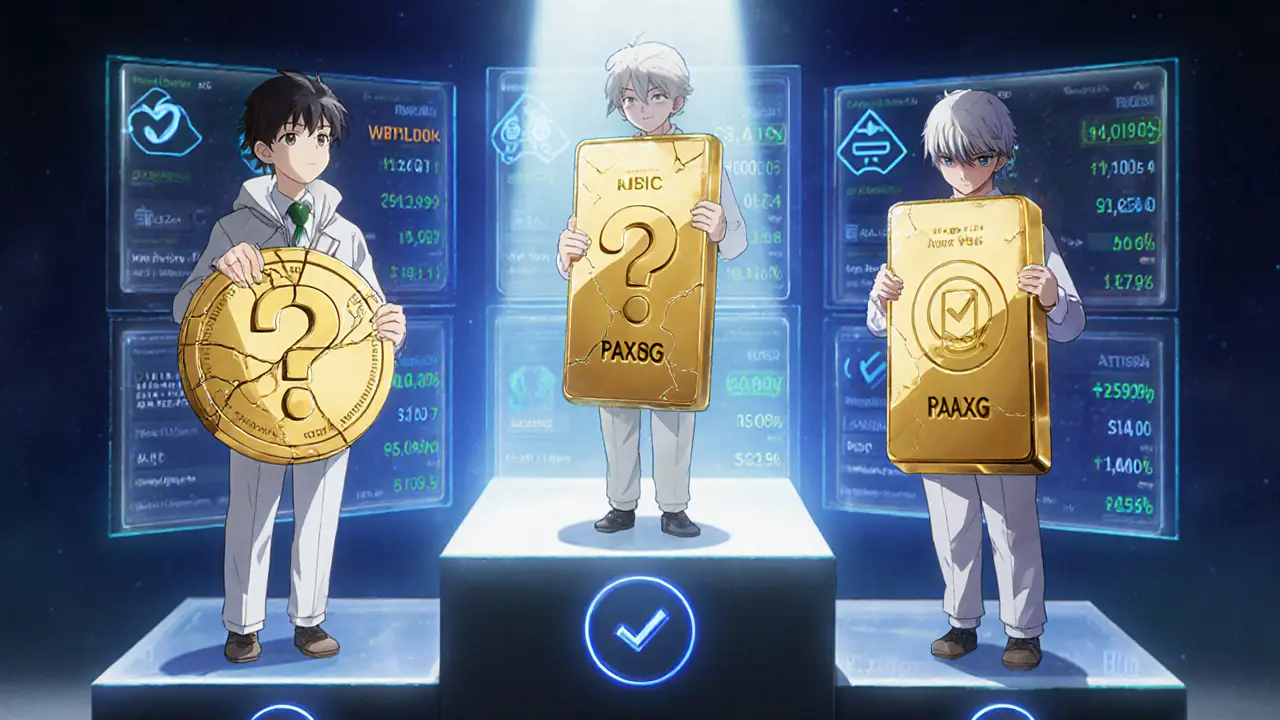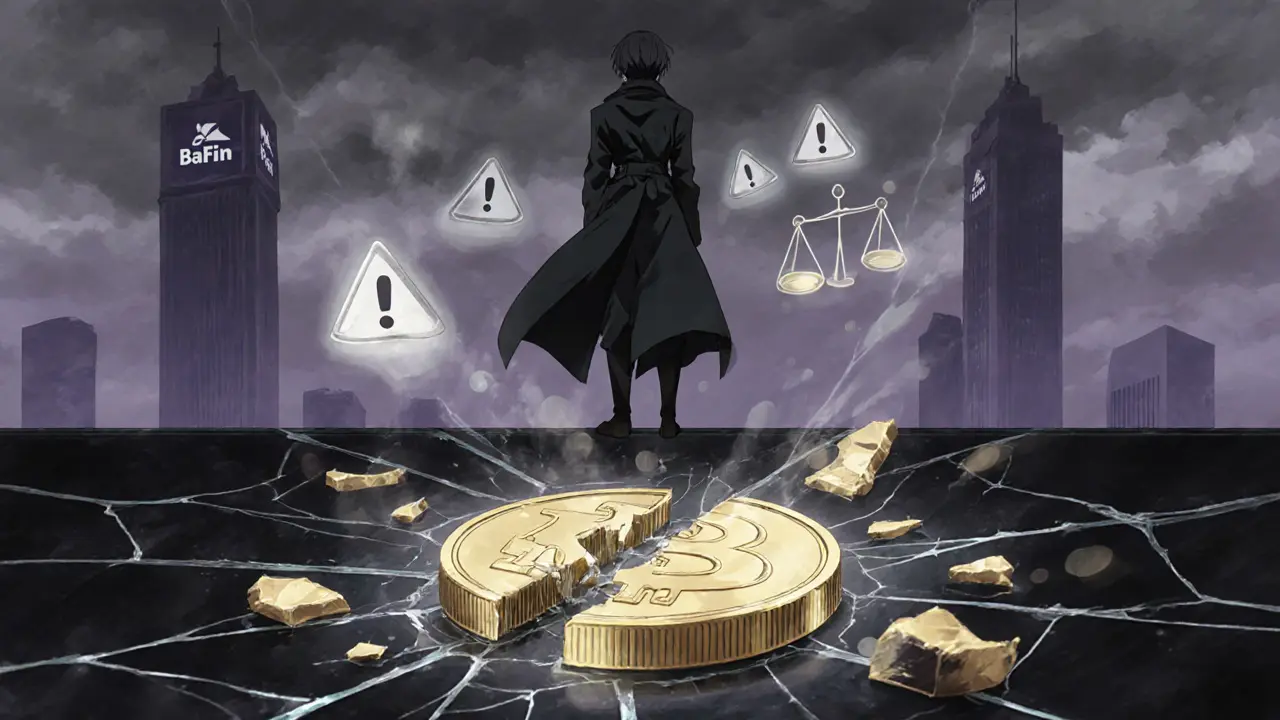KBC vs. Gold-Backed Tokens Comparison Tool
This tool compares Karatgold Coin (KBC) against established gold-backed tokens like Paxos Gold (PAXG) and Tether Gold (XAUT). It highlights key metrics including backing mechanism, current price, trading volume, and regulatory status.
| Token | Backing Mechanism | Current Price (USD) | 24h Volume | Regulatory Status |
|---|---|---|---|---|
| Karatgold Coin (KBC) | Claimed physical gold, no audited proof | $0.0011 | $0 (near-zero) | Warnings from BaFin & NZFMA |
| Paxos Gold (PAXG) | One gram of LBMA-approved gold per token, audited | $1.84 | $12M | Fully regulated in US & EU |
| Tether Gold (XAUT) | One troy ounce of gold per token, audited | $1,950 | $8M | Regulated in Singapore |
Analysis Summary
Karatgold Coin (KBC) differs significantly from verified gold-backed tokens like PAXG and XAUT. While KBC claims to be backed by physical gold, it lacks transparent auditing and has minimal trading volume. In contrast, PAXG and XAUT offer verified gold reserves, strong liquidity, and regulatory compliance.
KBC's price has dropped over 99% since its peak, and daily volume remains near zero, making it highly illiquid. Regulatory warnings from BaFin and NZFMA further raise concerns about its legitimacy and legal standing.
Key Takeaways
- Karatgold Coin (KBC) is an ERC‑20 token that claims to be backed by physical gold.
- It launched in 2018, raised $100million, but now trades below $0.002 per token.
- Liquidity is almost nonexistent; most platforms show zero daily volume.
- Regulators in Germany and New Zealand have issued warnings about the project.
- Because of low liquidity, regulatory risk, and stalled development, KBC is generally considered a high‑risk speculative asset.
What is Karatgold Coin (KBC)?
When you first hear about Karatgold Coin (KBC) is a gold‑backed cryptocurrency that lives on the Ethereum blockchain, the idea sounds appealing: a digital token that represents a real ounce of gold without needing a bank. In reality, KBC is an ERC‑20 token created by Karatbars International in February2018. The token’s smart contract is fixed at address 0xf3586684107CE0859c44aa2b2E0fB8cd8731a15a, and the total supply caps at 12billion tokens.
How does the gold backing work?
KBC’s marketing says each token is linked to “CashGold,” a physical gold reserve stored in vaults. The company claims that for every KBC token purchased, a corresponding amount of gold is locked away. However, the project never published audited proof of those reserves, and independent researchers have been unable to verify a one‑to‑one ratio. Compare this to Paxos Gold (PAXG) or Tether Gold (XAUT), which provide regular third‑party attestations that each token is fully backed by gold.
In practice, KBC’s “gold‑backing” is more of a promise than a verifiable guarantee. The token’s value on exchanges has drifted far away from the price of gold, falling over 99% from its ICO price of $0.05 to under $0.002 in 2025.
Technical basics - Ethereum and ERC‑20
KBC lives on Ethereum, the world’s most popular smart‑contract platform. As an ERC‑20 token, it inherits standard functions such as transfer() and balanceOf(), meaning you can store it in any wallet that supports Ethereum (MetaMask, Trust Wallet, hardware wallets, etc.). The token does not have its own blockchain, so transaction fees are paid in ETH, not in KBC.
The technical side is straightforward, but the real challenge is the lack of a functional ecosystem. The promised Karatgold wallet and dedicated exchange never materialized, and most major crypto platforms simply do not list KBC.

Market performance and liquidity
After a hype‑filled ICO that raised about $100million, KBC peaked at $0.1261 on July32019. Since then, the price has slumped to roughly $0.0011 in October2025. Daily trading volume is effectively zero, and the reported circulating supply on most data sites is “0KBC,” raising questions about how many tokens are actually in public hands.
To illustrate where KBC stands today, look at the comparison below.
| Token | Backing Mechanism | Current Price (USD) | 24h Volume | Regulatory Status |
|---|---|---|---|---|
| Karatgold Coin (KBC) | Claimed physical gold, no audited proof | $0.0011 | $0 (near‑zero) | Warnings from BaFin & NZFMA |
| Paxos Gold (PAXG) | One gram of LBMA‑approved gold per token, audited | $1.84 | $12M | Fully regulated in US & EU |
| Tether Gold (XAUT) | One troy ounce of gold per token, audited | $1,950 | $8M | Regulated in Singapore |
As the table shows, KBC’s market cap hovers around $13‑14million, while PAXG and XAUT each sit above $1billion. The liquidity gap makes it almost impossible to buy or sell KBC without huge price slippage.
Regulatory warnings and legal concerns
In 2020, Germany’s Federal Financial Supervisory Authority (BaFin) issued a public notice that Karatbars International and related entities were not authorized to conduct banking or securities activities. A similar statement came from the NewZealand Financial Markets Authority (NZFMA) in 2021. Neither agency has granted a license for KBC to operate as a tokenized gold product.
These warnings matter because they limit the token’s ability to be listed on regulated exchanges and increase the risk of enforcement actions. Investors in jurisdictions with strict securities laws could face legal scrutiny if KBC is deemed an unregistered security.
Risks and why most experts stay away
- Liquidity risk: With virtually no daily trading, you may never be able to exit a position.
- Regulatory risk: BaFin and NZFMA warnings signal potential compliance problems.
- Transparency risk: No audited gold reserves, ambiguous circulating supply.
- Development risk: Roadmap milestones for 2020 were never delivered.
- Price risk: Token price has fallen more than 99% from its ICO level.
Because of these factors, most cryptocurrency analysts label KBC as a high‑risk speculative token rather than a reliable gold‑backed store of value.
Can you still buy or trade KBC?
If you really want to own KBC, you’ll need to locate one of the few small exchanges that still list the token, such as Idex or Mercatox. The steps are:
- Set up an Ethereum‑compatible wallet (MetaMask is a common choice).
- Buy ETH on a major exchange and transfer it to your wallet.
- Connect your wallet to the chosen exchange and place a limit order for KBC at the current price.
- Be prepared for the order to sit idle for days or weeks because of thin order books.
After the token arrives in your wallet, you can hold it, but there is no practical way to spend it as “digital gold” given the lack of merchant acceptance.
Bottom line - is KBC worth your attention?
If you are looking for a gold‑backed crypto with real world backing, clear audits, and decent liquidity, tokens like PAXG or XAUT are the obvious choices. KBC might still appeal to collectors who want a piece of crypto history or who believe the project could revive, but the odds are low.
In short, treat Karatgold Coin as a cautionary tale of a promising idea that stalled under regulatory pressure, lack of transparency, and market neglect.

Frequently Asked Questions
What does KBC stand for?
KBC is the ticker symbol for Karatgold Coin, the gold‑backed ERC‑20 token created by Karatbars International.
Is KBC fully backed by physical gold?
The project claims each token represents a portion of “CashGold,” but no audited proof of reserves has been published, so the backing cannot be independently verified.
Can I store KBC in a hardware wallet?
Yes. Because KBC follows the ERC‑20 standard, any hardware wallet that supports Ethereum (Ledger, Trezor) can hold it.
Why is the circulating supply listed as zero?
Most tracking sites show zero because the token distribution on Ethereum has not been fully indexed or because the majority of tokens are held in contracts that are not counted as circulating.
Is KBC legal to buy in the United States?
There is no specific U.S. ban, but because the token lacks a clear regulatory framework and has been flagged by European authorities, U.S. investors should treat it as an unregistered security and proceed with caution.

Prince Chaudhary
March 8, 2025 AT 09:29While the idea of a gold‑backed token is appealing, it's crucial to keep expectations realistic. The lack of audited reserves means investors should treat KBC with caution. Consider diversifying into tokens with transparent backing before committing significant capital. Stay disciplined and protect your portfolio.
John Kinh
March 13, 2025 AT 00:36Looks like another overhyped token to me 😂
celester Johnson
March 17, 2025 AT 10:09When we stare into the abyss of unverified crypto promises, we often see our own reflections of greed and fear. KBC pretends to be a bridge between gold and blockchain, yet the bridge is built on sand. The emptiness of its volume mirrors the void of trust that surrounds it. Every token without proof of reserve becomes a philosophical exercise in belief versus evidence. In the end, speculation without substance only feeds the market's collective anxiety.
Mark Camden
March 21, 2025 AT 11:23It is incumbent upon investors to demand transparency when dealing with any financial instrument, particularly those purporting to be backed by tangible assets. The Karatgold Coin project has repeatedly failed to provide verifiable audit reports, thereby undermining its credibility. Regulatory bodies such as BaFin and the NZFMA have issued formal warnings, which should not be dismissed lightly. A token that cannot demonstrate a one‑to‑one gold reserve cannot logically be classified as a stable store of value. Moreover, the near‑zero daily trading volume suggests a market devoid of liquidity, rendering price discovery impossible. In the absence of liquidity, any attempt to enter or exit a position may result in severe slippage. This reality poses a substantial risk to capital preservation. Investors must also consider the legal implications of holding assets deemed unregistered securities in certain jurisdictions. The lack of a clear regulatory framework further amplifies potential compliance challenges. Ethically, it is questionable to market a product that may mislead participants regarding its underlying value. The project's historical failure to meet its roadmap milestones reflects poorly on its governance. Without a functional ecosystem, the token cannot achieve meaningful adoption. Additionally, the absence of audited gold reserves contradicts the core promise of a gold‑backed token. The discrepancy between the token’s claimed backing and the observable evidence is stark. Consequently, one should treat KBC as an experimental asset rather than a reliable hedge. The prudent course of action is to allocate capital to assets with demonstrable transparency and robust regulatory standing. In summary, the combination of regulatory warnings, liquidity deficiencies, and opaque backing mechanisms makes Karatgold Coin a high‑risk speculative endeavor.
Evie View
March 25, 2025 AT 09:49The audacity of promoting KBC as a gold‑backed token without proof is downright reckless. Investors deserve far better than hollow promises and vague statements. This project flirts with deception, and that should trigger alarm bells for any sensible trader. It’s time to call out the misinformation and protect potential victims.
Jayne McCann
March 29, 2025 AT 05:29I think people are overreacting; maybe it will bounce someday.
Richard Herman
April 1, 2025 AT 23:23Let’s keep the conversation constructive. While KBC has clear shortcomings, it also provides a learning case for the community about the importance of audit transparency. Encouraging open dialogue can help newcomers understand what to look for in reputable projects.
Parker Dixon
April 5, 2025 AT 13:29Great point about the need for audits! 👍 If you’re still interested in gold‑backed tokens, I recommend starting with PAXG or XAUT, both of which publish regular attestations. You can also check the token’s custodial reports on the issuer’s website. Remember, diversification reduces risk, so don’t put all your eggs in a single, unverified basket. 😊
Stefano Benny
April 9, 2025 AT 00:49From a technical standpoint, KBC’s ERC‑20 implementation is standard, but the tokenomics lack depth. Without a clear reserve audit, the asset‑backing claim remains speculative. 🤔 Investors should prioritize tokens with vetted collateralization ratios and transparent governance.
Bobby Ferew
April 12, 2025 AT 06:36Honestly, the hype around KBC feels like a classic case of FOMO‑driven speculation. While the blockchain code is fine, the real issue is the missing gold proof. It’s a passive‑aggressive reminder that not every token lives up to its marketing hype.
Sidharth Praveen
April 15, 2025 AT 06:49Stay hopeful but stay vigilant – thorough research can save you from costly mistakes.
Sophie Sturdevant
April 18, 2025 AT 01:29From a strategic perspective, the lack of audited gold reserves makes KBC a high‑risk asset. You should prioritize tokens with documented backing. This approach mitigates exposure and aligns with sound risk management principles.
Somesh Nikam
April 20, 2025 AT 14:36It’s clear that the project's roadmap has stalled, and without transparent audits the token’s credibility suffers. 📈 However, if you’re looking to diversify, consider allocating a small portion to verified gold‑backed tokens while keeping the majority in more liquid assets. This balanced approach protects your capital and maintains flexibility.
Jan B.
April 22, 2025 AT 22:09Agree we should all share reliable info and avoid hype.
emmanuel omari
April 25, 2025 AT 00:09As a citizen proud of my country's financial sovereignty, I find it concerning that foreign projects like KBC can operate without strict oversight. Strong national regulation is essential to protect investors from such dubious schemes.
Andy Cox
April 26, 2025 AT 20:36Seems like KBC is just another flash in the pan.